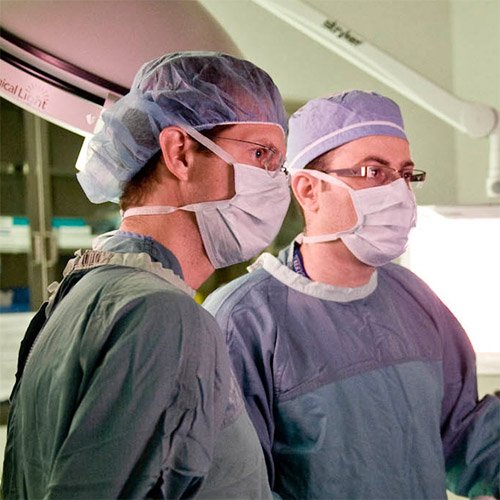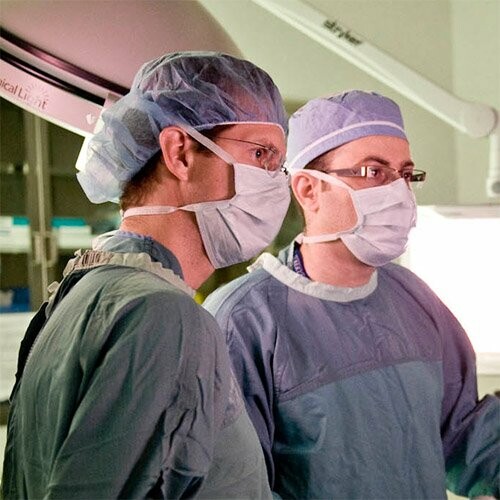Our Hospital, Our StoriesCAMIS: Training the Next Generation of Surgeons
Posted on: Mar 24, 2016Traditional surgery requires large incisions of the abdomen, chest, or joint areas in order for surgeons to carry out procedures. With Minimally Invasive Surgery, the opposite is true. Small incisions are made at strategic points…

Traditional surgery requires large incisions of the abdomen, chest, or joint areas in order for surgeons to carry out procedures. With Minimally Invasive Surgery, the opposite is true. Small incisions are made at strategic points in the body, allowing for a light source, a tiny camera, and specialized, precision tools such as forceps, scissors, and dissecting tools to be employed into the surgery area. The result is less damage to surrounding tissues, less pain and discomfort, less risk of infection, a shorter hospital stay, and a faster recovery time. Minimally invasive surgery can mean a world of difference to a patient.
Dr. Dan Birch is the Director of CAMIS, the Centre for the Advancement of Minimally Invasive Surgery. Based at the Royal Alexandra hospital, CAMIS collaborates with multiple educational organizations within the province, including the University of Alberta, the University of Calgary, MacEwan University and Norquest College. Dr. Birch is passionate about MIS, what it means to patients, and what it means for the Royal Alex.
“In the past 20 years, MIS has expanded to include bariatric surgery, gynecological surgeries, lung or esophagus procedures, and also joint surgery,” explains Dr. Birch. “It has resulted in much better outcomes for patients facing these complex procedures. The Royal Alex is certainly known across Canada as a centre that excels in MIS, whether it’s traditional laparoscopic procedures or robotic surgery.”
Between traditional laparoscopic surgery and robotic surgery – employing the incredible daVinci Robotic Surgical System – the Royal Alexandra Hospital is considered a leader in Minimally Invasive Surgery in Canada. Dr. Birch says that not only the volume of MIS at the Royal Alex is noteworthy, but the vigorous and innovative training that the Centre for the Advancement of Minimally Invasive Surgery offers.
“We are definitely known across Canada for having a more structured curriculum,” says Dr. Birch. “CAMIS certainly offers a more robust environment for training and practice in MIS. More importantly, our innovative team training approach is something quite unique to the Royal Alex. Our hope is that our methods will inspire other training centres to do the same.”
CAMIS’ original goal was to introduce a more structured approach to learning MIS for surgeons. The organization’s methods have changed to a more expanded approach with training. CAMIS endeavors to train the whole team – not just surgeons, but MIS nurses and technicians as well. One learning environment can now be used to train, in parallel, the entire surgical team, making for a more efficient, collegial, and cost-effective training method.
“By bringing the surgical team together, it’s certainly amplified the training experience,” says Keith Andony, Education Coordinator for CAMIS. “When the whole team is there in the learning environment, playing the roles they would be during an actual surgery, it’s more true to life. They’re going to be on the same surgical team at some point, so training them together makes a lot of sense.”
While these thoughtful approaches to training have made the CAMIS program more robust and efficient, it’s still an intense environment involving a steep learning curve.
“While we believe we have reduced the amount of learning time, we have also increased the expectations for our trainee surgeons,” says Dr. Birch, who uses a sports analogy to illustrate his point.
“A hockey player in the NHL player practices every week,” explains Dr. Birch. “Once they reach a certain amount of hours of training, they’re ready to play professionally. But that training continues, even when their team has won the Stanley Cup. With surgeons, we haven’t always had that same approach, but CAMIS is helping to change that culture.”
“For trainees who want to include MIS in their clinical practice, they need to commit to an additional one or two years of fellowship training. To develop an advanced skill set, you may have to practice on a daily basis, you may have to practice repetitive skills over and over again until it becomes second nature, in order to be competent with some of these difficult surgical procedures.”
“Our goal is to provide trainees with those advanced skill sets – not just training in the operating room, but in the classroom, in simulation labs, wherever we have the opportunity for residents to recognize what they need to learn.”
